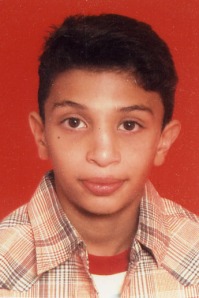(Ali Jawad Al-Sheik would have been 17 years old had he not been killed by riot police in Bahrain 3 years ago today. Below, is what I wrote on the Witness Bahrain blog two years ago when I was in Bahrain, after meeting his family.)
Ali Al-Sheikh loved playing sports, swimming, and taking photographs. Photography was a growing passion of his. At age
fourteen, he was already on his fourth camera, constantly begging his parents for bigger and better ones.
Ali’s little brother, twelve-year-old Ahmad, seems to have inherited his brother’s interest in cameras. In his home two nights ago, he motioned for me to hand him my video camera so he could film his mother (Um Ali) showing me Ali’s possessions in their small apartment in Sitra, Bahrain.
Ahmad scrambled onto the bed to get a good angle and opened the view finder as Um Ali buried her face in a pile of Ali’s sports shirts, breathed in their odor, and began to cry.
She has been smelling Ali’s clothes and blanket every night before she goes to sleep since August 31, 2011, the day that her son was shot and killed by a tear gas canister to the back of his head.
Ali had been active in the protests since the beginning of Bahrain’s pro-democracy uprising, in the Pearl Roundabout days. After Ali’s friend was killed, his participation intensified. Ali went to every funeral/demonstration for every shaheed (martyr). He witnessed the impact of the crackdown, seeing homes in his neighborhood raided nightly. Ali was also no stranger to the poverty and unemployment that protestors say are a result of sectarian discrimination. Ali, Ahmad, and their two sisters all slept in one bedroom, long past the age when Islamic tradition considers it acceptable.
Yet despite their modest means, Ali’s parents did all they could to encourage his development. In fact, his mother bought Ali a new camera as a gift for Eid (the festival at the conclusion of Ramadan).
She never gave him the camera.
On the morning of the Eid, Ali went to pray and then returned home briefly, only to turn around and start to head out of the door again.
“Ali, where are you going?” his mother asked. “Take a shower and put on your new Eid clothes.”
“I’ll be right back, Mom,” the boy insisted.
“Don’t be long. We have to get to your grandmother’s house before they block the roads.”
Ali and Ahmad, then eleven years old, scurried out of the apartment. Shortly after, Um Ali heard tear gas being fired—a sound she had grown accustomed to.
Ahmad rushed inside moments later. “They attacked us!”
This, too, had become “normal” yet Um Ali’s heart constricted. “Where’s Ali?”
Ahmad held out Ali’s cell phone. “When the shooting began, he told me to take his phone and run home.”
Ali’s father (Abu Ali) received a call on his cell phone. Ali was slightly injured, the caller said, and had been taken to the Sitra medical clinic. Abu Ali rushed there right away while Um Ali remained at home, panicked, trying to call her husband and anyone she could think of for an update, but no one answered. Finally, she reached one of Ali’s friends.
“Where is Ali? Why is no one answering me? Where is Ali? Tell me!”
“Ali is a martyr,” the friend told her. “He is with God.”
Um Ali screamed and hung up the phone, going into a state of extreme shock and denial. Groups of mourners who gathered in the apartment found her lying on the sofa, wailing, “Bring Ali to me! I want my son back!”
The disbelief continues ten months later. The Al-Sheikh home is a shrine to Ali. Ali’s image, with full lips and brown, soulful eyes, adorn every inch of wall space. Pre-school aged Ali with his baby brother. Ten-year-old Ali bobbing in the swimming pool. Twelve-year-old Ali proudly holding a certificate of achievement from school. Fourteen-year-old Ali standing defiantly at the Pearl Roundabout with his not-yet-martyred friend just behind him. It still feels like a bad dream to his mother, a dream she still believes she’ll wake up from, and find her son at her side again, helping her with the computer or showing her how to send a text message, as he always did. Ahmad and nine-year-old Fatima try to coax their mother out of her tears, and encourage her to get over the loss of Ali.
I have known too many mothers of martyred children, whether killed in Palestine/Israel, Bosnia or Northern Ireland, and I know: Um Ali may be able to eventually continue her life, but she will never recover. The family will carry the gaping wound from the place Ali once occupied long after his photographs go back into albums and his clothes and notebooks are packed into boxes.
Um Ali prays that those responsible for her son’s murder will be held accountable. She wants them to know the same pain she is experiencing. She wants them to understand the depth of the tragedy of a young teenaged boy, demonstrating for his freedom and his future, cut down before he had the chance build that future.
Before taking a single photograph with his new camera.


